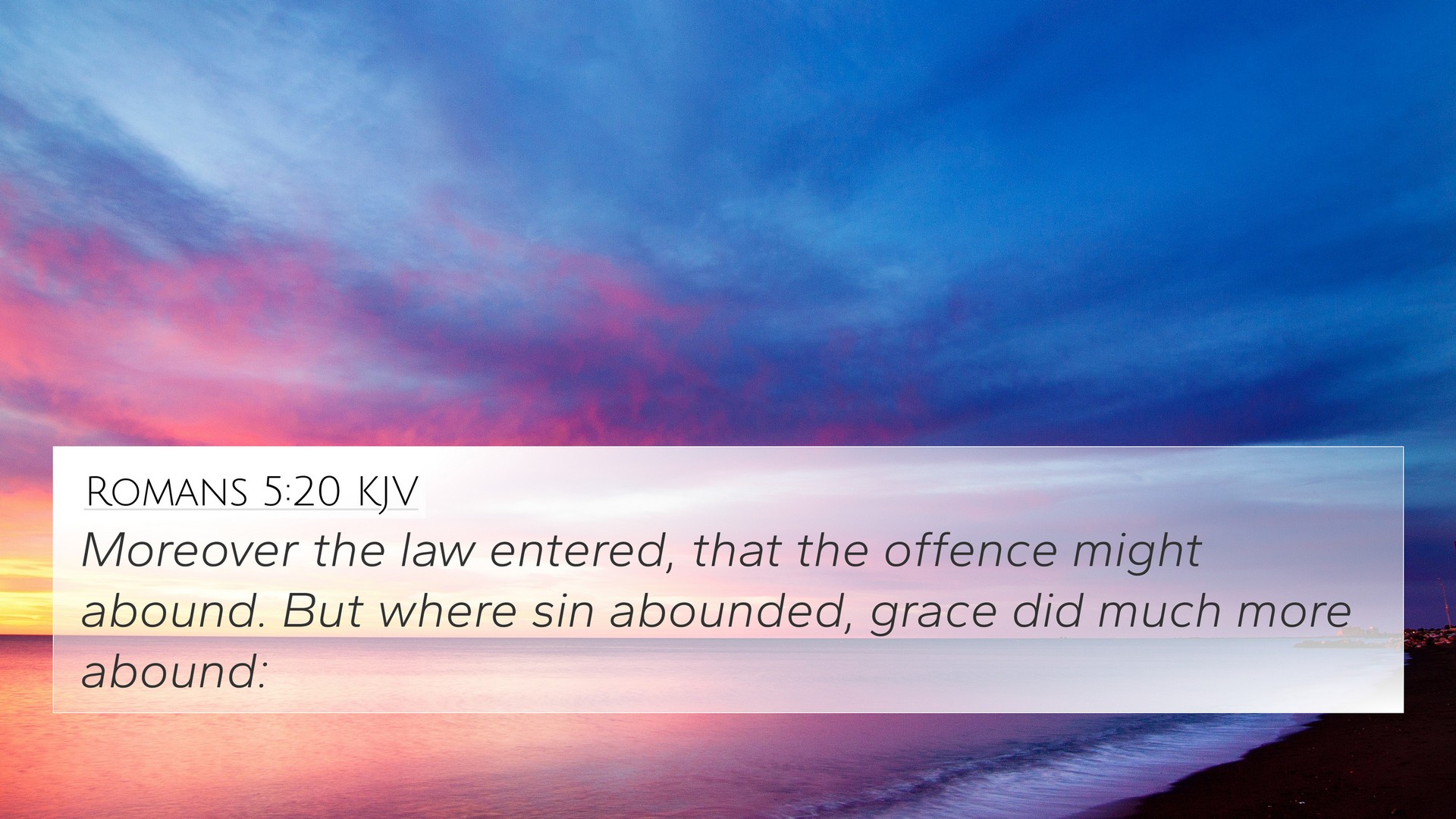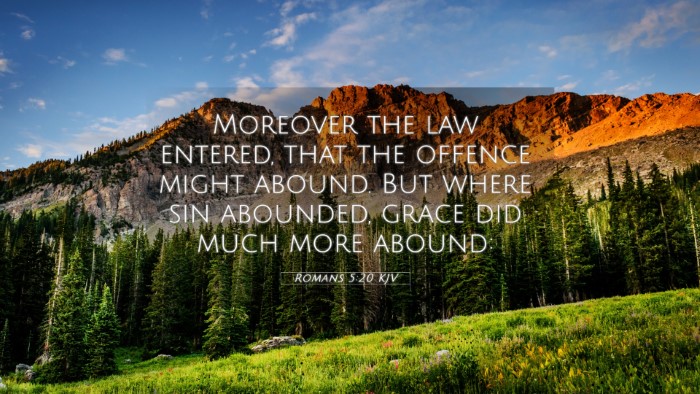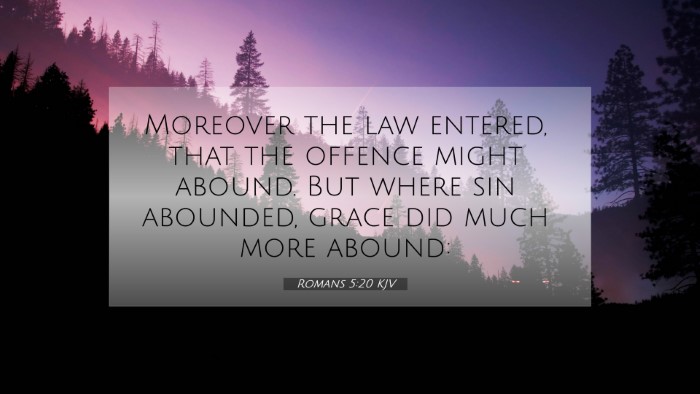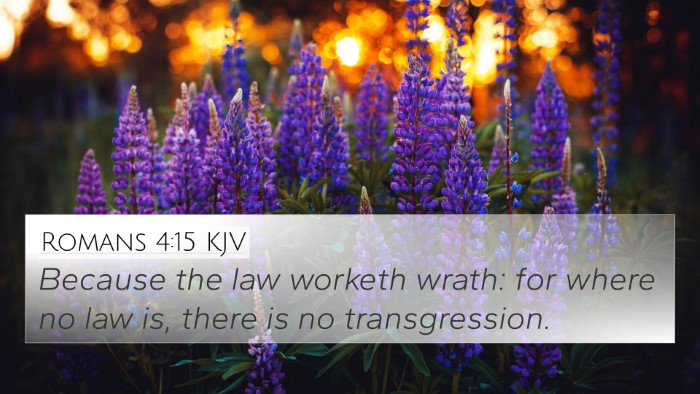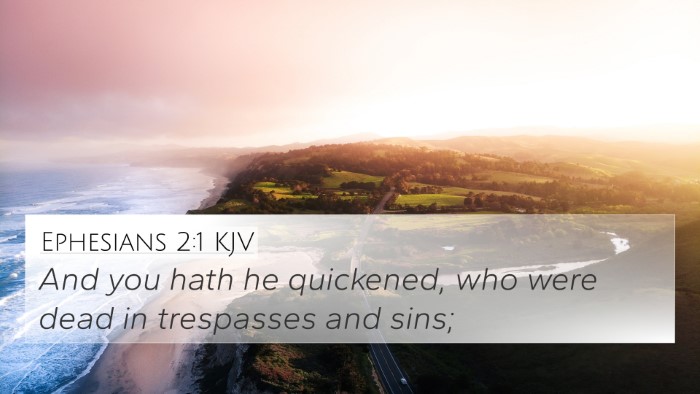Old Testament
Genesis Exodus Leviticus Numbers Deuteronomy Joshua Judges Ruth 1 Samuel 2 Samuel 1 Kings 2 Kings 1 Chronicles 2 Chronicles Ezra Nehemiah Esther Job Psalms Proverbs Ecclesiastes Song of Solomon Isaiah Jeremiah Lamentations Ezekiel Daniel Hosea Joel Amos Obadiah Jonah Micah Nahum Habakkuk Zephaniah Haggai Zechariah MalachiRomans 5:20 Similar Verses
Romans 5:20 Cross References
Moreover the law entered, that the offence might abound. But where sin abounded, grace did much more abound:
Uncover the Rich Themes and Topics of This Bible Verse
Listed below are the Bible themes associated with Romans 5:20. We invite you to explore each theme to gain deeper insights into the Scriptures.
Romans 5:20 Cross Reference Verses
This section features a detailed cross-reference designed to enrich your understanding of the Scriptures. Below, you will find carefully selected verses that echo the themes and teachings related to Romans 5:20 KJV. Click on any image to explore detailed analyses of related Bible verses and uncover deeper theological insights.
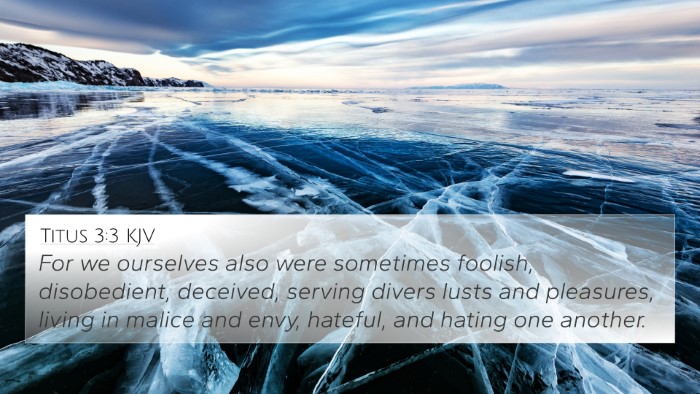
Titus 3:3 (KJV) »
For we ourselves also were sometimes foolish, disobedient, deceived, serving divers lusts and pleasures, living in malice and envy, hateful, and hating one another.
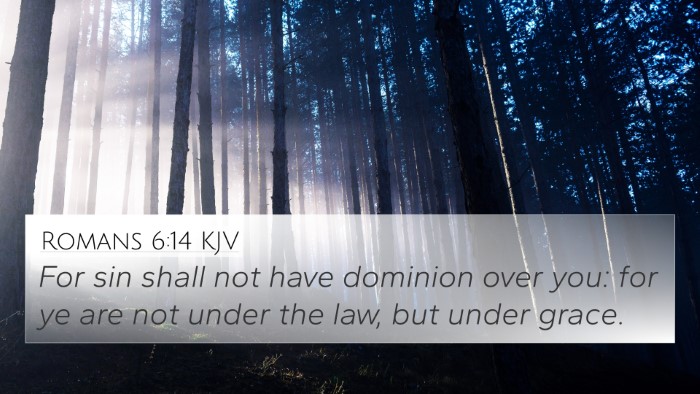
Romans 6:14 (KJV) »
For sin shall not have dominion over you: for ye are not under the law, but under grace.
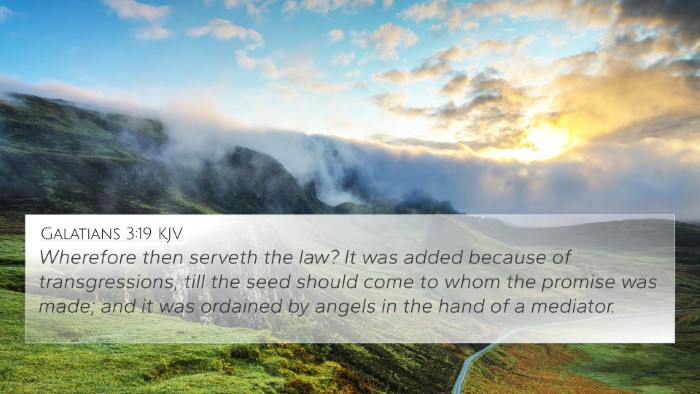
Galatians 3:19 (KJV) »
Wherefore then serveth the law? It was added because of transgressions, till the seed should come to whom the promise was made; and it was ordained by angels in the hand of a mediator.
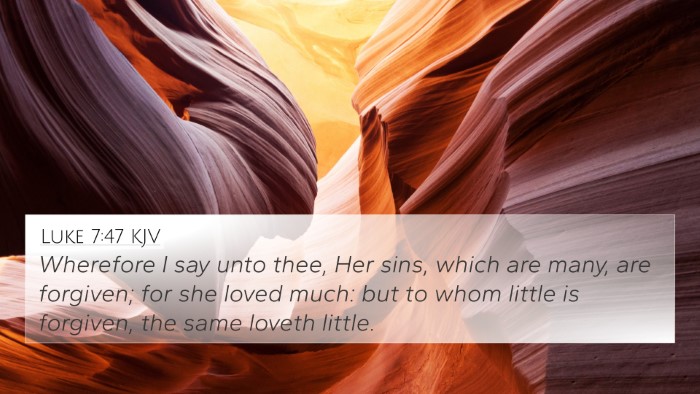
Luke 7:47 (KJV) »
Wherefore I say unto thee, Her sins, which are many, are forgiven; for she loved much: but to whom little is forgiven, the same loveth little.
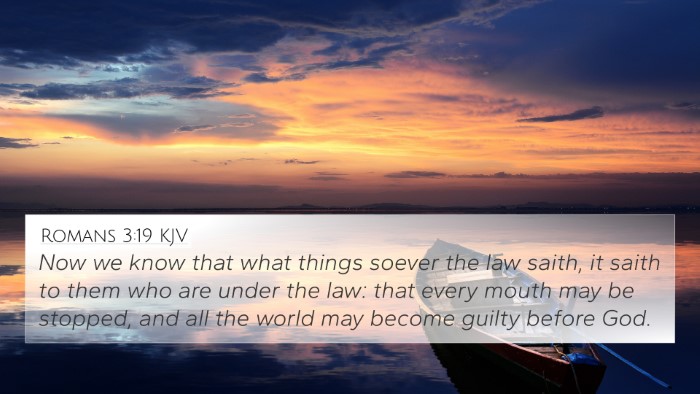
Romans 3:19 (KJV) »
Now we know that what things soever the law saith, it saith to them who are under the law: that every mouth may be stopped, and all the world may become guilty before God.
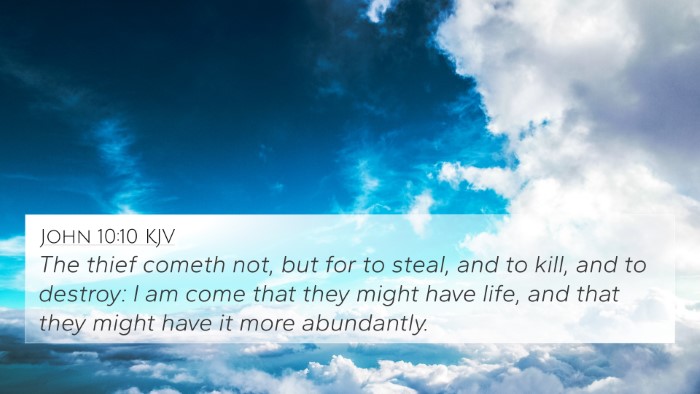
John 10:10 (KJV) »
The thief cometh not, but for to steal, and to kill, and to destroy: I am come that they might have life, and that they might have it more abundantly.
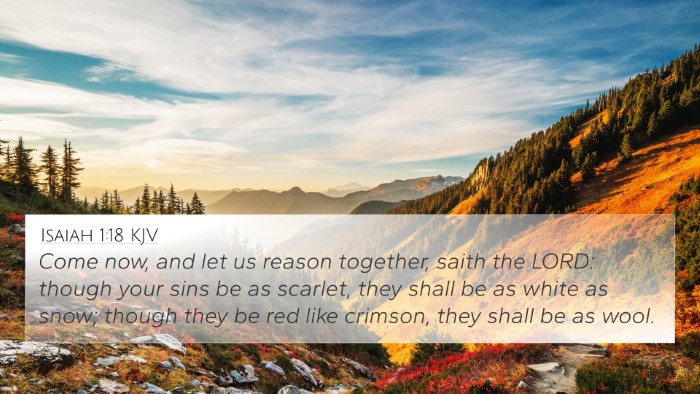
Isaiah 1:18 (KJV) »
Come now, and let us reason together, saith the LORD: though your sins be as scarlet, they shall be as white as snow; though they be red like crimson, they shall be as wool.
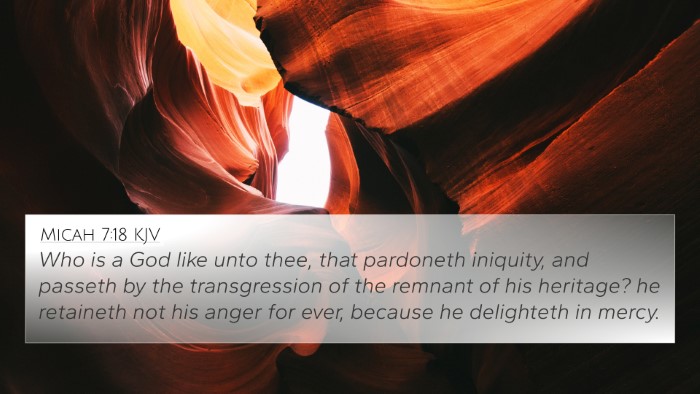
Micah 7:18 (KJV) »
Who is a God like unto thee, that pardoneth iniquity, and passeth by the transgression of the remnant of his heritage? he retaineth not his anger for ever, because he delighteth in mercy.
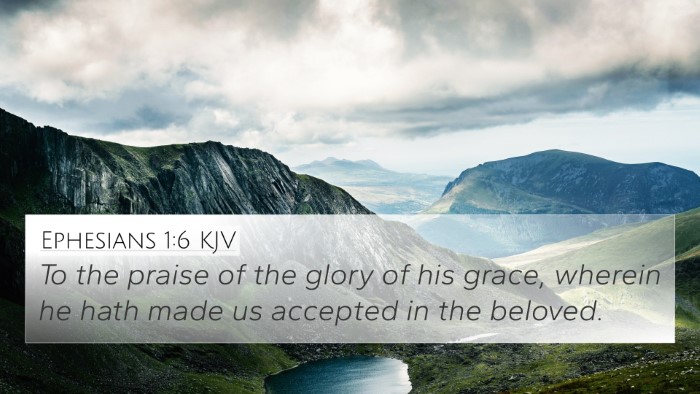
Ephesians 1:6 (KJV) »
To the praise of the glory of his grace, wherein he hath made us accepted in the beloved.
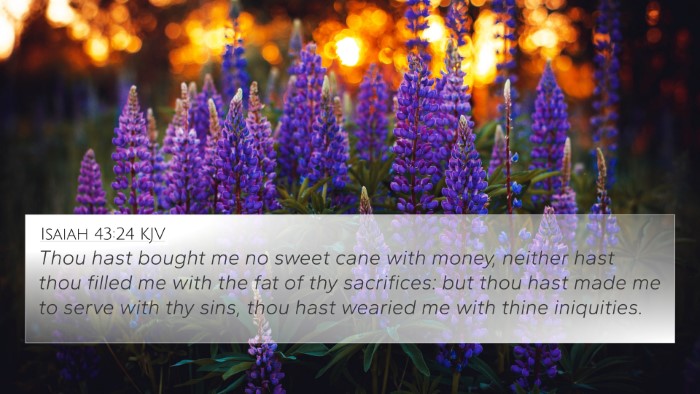
Isaiah 43:24 (KJV) »
Thou hast bought me no sweet cane with money, neither hast thou filled me with the fat of thy sacrifices: but thou hast made me to serve with thy sins, thou hast wearied me with thine iniquities.
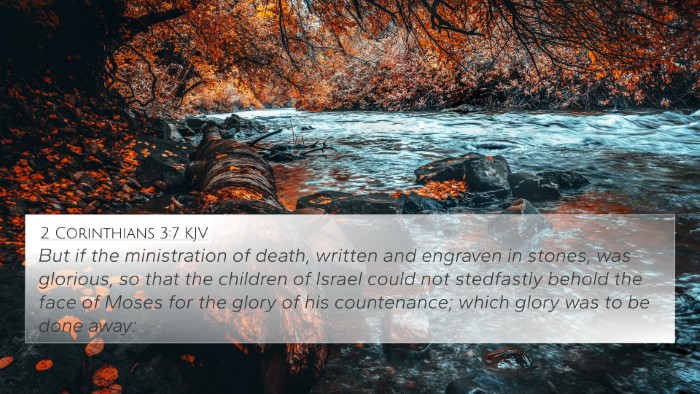
2 Corinthians 3:7 (KJV) »
But if the ministration of death, written and engraven in stones, was glorious, so that the children of Israel could not stedfastly behold the face of Moses for the glory of his countenance; which glory was to be done away:
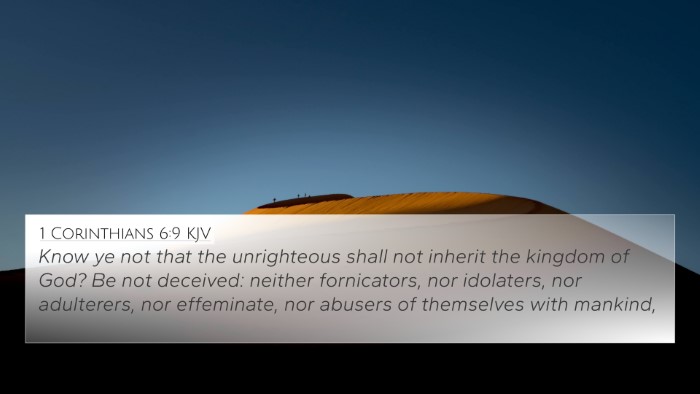
1 Corinthians 6:9 (KJV) »
Know ye not that the unrighteous shall not inherit the kingdom of God? Be not deceived: neither fornicators, nor idolaters, nor adulterers, nor effeminate, nor abusers of themselves with mankind,
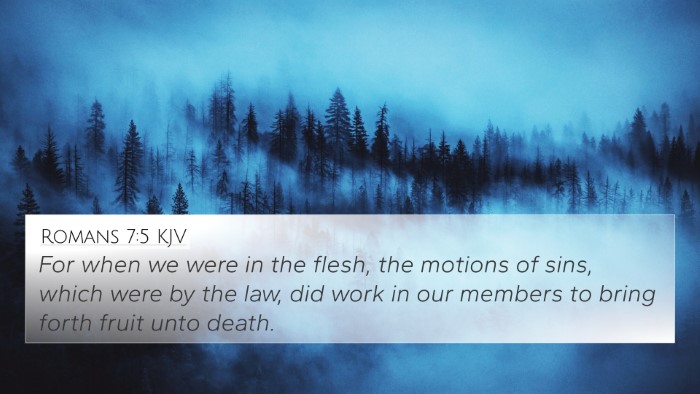
Romans 7:5 (KJV) »
For when we were in the flesh, the motions of sins, which were by the law, did work in our members to bring forth fruit unto death.
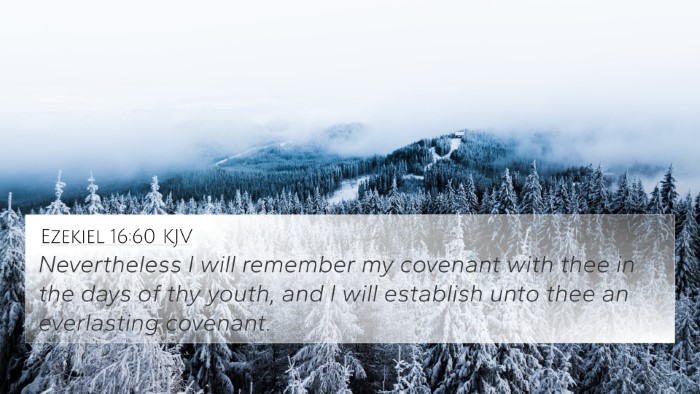
Ezekiel 16:60 (KJV) »
Nevertheless I will remember my covenant with thee in the days of thy youth, and I will establish unto thee an everlasting covenant.

Ezekiel 36:25 (KJV) »
Then will I sprinkle clean water upon you, and ye shall be clean: from all your filthiness, and from all your idols, will I cleanse you.
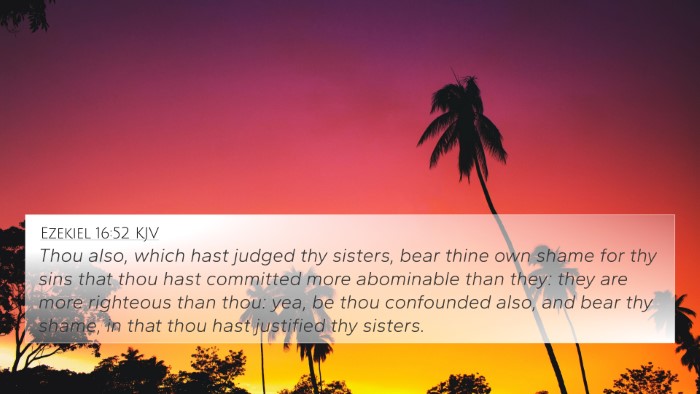
Ezekiel 16:52 (KJV) »
Thou also, which hast judged thy sisters, bear thine own shame for thy sins that thou hast committed more abominable than they: they are more righteous than thou: yea, be thou confounded also, and bear thy shame, in that thou hast justified thy sisters.
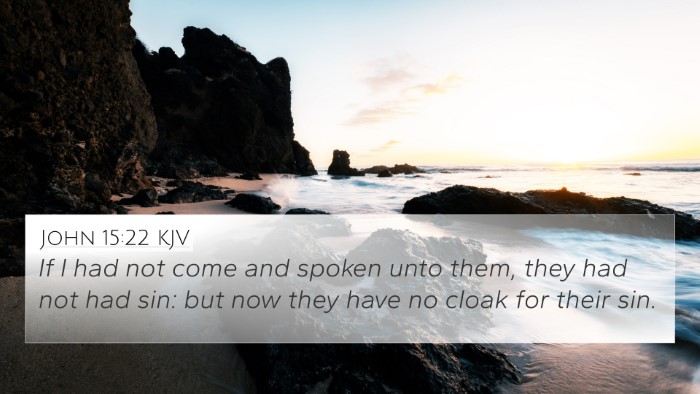
John 15:22 (KJV) »
If I had not come and spoken unto them, they had not had sin: but now they have no cloak for their sin.

Matthew 9:13 (KJV) »
But go ye and learn what that meaneth, I will have mercy, and not sacrifice: for I am not come to call the righteous, but sinners to repentance.
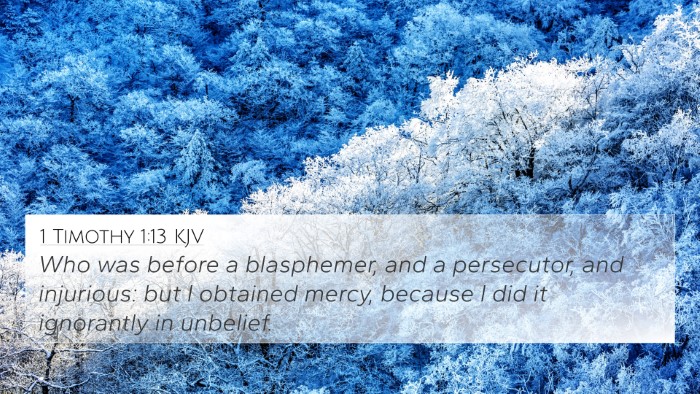
1 Timothy 1:13 (KJV) »
Who was before a blasphemer, and a persecutor, and injurious: but I obtained mercy, because I did it ignorantly in unbelief.
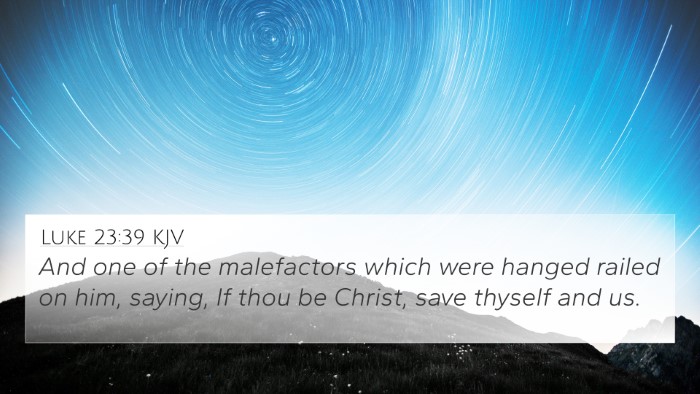
Luke 23:39 (KJV) »
And one of the malefactors which were hanged railed on him, saying, If thou be Christ, save thyself and us.
Romans 5:20 Verse Analysis and Similar Verses
Understanding Romans 5:20
“Moreover the law entered, that the offence might abound. But where sin abounded, grace did much more abound.” (Romans 5:20, KJV)
This verse is part of Paul's epistle to the Romans and discusses the relationship between sin and grace. Here’s a summary of its meaning based on public domain commentaries:
Key Themes of Romans 5:20
- The Purpose of the Law: The introduction of the Law serves to highlight human sinfulness. According to Matthew Henry, the Law amplifies the awareness of sin, revealing how far humans fall short of God's glory.
- Abounding Sin: Paul points out that sin became more evident through the Law, which Albert Barnes explains as an essential point - the Law identifies and magnifies transgression.
- Superabundant Grace: The latter part of the verse emphasizes that regardless of the extent of sin, God’s grace is even more abundant. Adam Clarke notes that the grace offered through Christ surpasses all human sinfulness.
Cross-Referencing Biblical Texts
This verse can be linked to several other scriptures that delve into the themes of sin and grace:
- Romans 3:20 - "For by the law is the knowledge of sin." This verse supports the idea that the Law promotes awareness of sin.
- 1 Timothy 1:15 - "This is a faithful saying, and worthy of all acceptation, that Christ Jesus came into the world to save sinners..." It emphasizes Christ's role in addressing human sinfulness.
- Romans 6:1-2 - "What shall we say then? Shall we continue in sin, that grace may abound? God forbid!" Paul clarifies the role of grace in light of the Law and sin.
- Ephesians 2:8-9 - "For by grace are ye saved through faith; and that not of yourselves: it is the gift of God." This ties back to the concept of salvation through grace.
- Titus 2:11 - "For the grace of God that bringeth salvation hath appeared to all men." It highlights the universal nature of grace.
- Galatians 3:19 - "Wherefore then serveth the law? It was added because of transgressions..." Reiterates the purpose of the Law in exposing sin.
- Psalm 103:10-12 - "He hath not dealt with us after our sins; nor rewarded us according to our iniquities..." Reflects God's grace in light of our failings.
Comparative Bible Verse Analysis
Links between the verses help to decipher the overarching narratives of sin and redemption throughout the Bible. Analyzing these connections aids in the understanding of theological concepts:
- Identifying Connections: Romans 5:20 elucidates the transition from the law of sin and condemnation to the law of grace, as seen in John 1:17 which states, "For the law was given by Moses, but grace and truth came by Jesus Christ."
- Sermon Preparation: Pastoral sermons can utilize this verse alongside others like 2 Corinthians 5:21, illustrating our exchange with Christ, in which He bore our sins to grant us righteousness.
- Inter-Biblical Dialogue: By cross-referencing with Psalm 51:5, which acknowledges human sinfulness, one can more deeply appreciate the redemption narrative.
Thematic Bible Verse Connections
Evaluating how this verse connects with broader themes in the Bible can help solidify the understanding of grace:
- Grace as a Central Theme: Romans 5:20 aligns with the doctrine of grace prevalent throughout Paul’s epistles, inviting believers to contemplate grace's sufficiency.
- Sin's Universality: This verse also emphasizes the universal nature of sin, linking it to Genesis 6:5 which states, "And God saw that the wickedness of man was great in the earth..."
Conclusion
Romans 5:20 serves as a pivotal verse linking the magnitude of sin to the greater reality of grace. By employing tools for Bible cross-referencing and exploring connections between this verse and others, believers can cultivate a deeper understanding of their faith.
